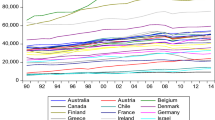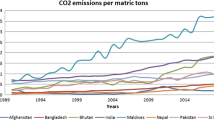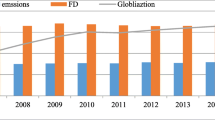Abstract
Climate change resulting from the higher concentration of greenhouse gases in the atmosphere is a threat to the sustainability of life on earth. To ensure sustainable development, the study analyzed the impact of financial development, globalization, and energy use on the environmental quality of South Asian economies over the period 1990–2014. To account for cross-sectional dependence, Breusch-Pagan-Lagrange multiplier, Pesaran-scaled Lagrange multiplier, bias-corrected-scaled Lagrange multiplier, and Pesaran cross-sectional dependence tests are used. The second-generation tests are used to determine the stationarity level of the variables. Furthermore, the Westerlund panel cointegration test confirms cointegration among the variables. For long-run association, fully modified ordinary least squares, dynamic ordinary least squares, and pooled mean group estimators are used. The results suggest that financial development contributes to carbon emissions, whereas globalization has the potential to control emissions. The study also used Dumitrescu and Hurlin’s (2012) panel causality test to explore the causal relationship among the variables. Unidirectional causality is observed from economic growth, globalization, and financial development to environmental degradation and from emissions to energy use, respectively. As financial development deteriorates environmental quality, therefore, the government should monitor the disbursement of loans for research and development, green financing, and efficient production that reduce resource consumption and improves environmental quality. Financial development should not compromise environmental quality and endanger sustainability. Furthermore, South Asian countries should promote globalization to support the inflow of green technologies to enhance environmental quality.





Similar content being viewed by others
Data availability
Data will be available on request.
References
Adams S, Klobodu EKM (2018) Financial development and environmental degradation: does political regime matter? J Clean Prod 197:1472–1479
Alam S, Fatima A, Butt MS (2007) Sustainable development in Pakistan in the context of energy consumption demand and environmental degradation. J Asian Econ 18:825–837
Al-Mulali U, Ozturk I (2015) The effect of energy consumption, urbanization, trade openness, industrial output, and the political stability on the environmental degradation in the MENA (Middle East and North African) region. Energy 84:382–389
Al-Mulali U, Saboori B, Ozturk I (2015) Investigating the environmental Kuznets curve hypothesis in Vietnam. Energy Policy 76:123–131
Antweiler W, Copeland BR, Taylor MS (2001) Is free trade good for the environment? Am Econ Rev 91(4):877–908
Apergis N, Payne JE, Menyah K, Wolde-Rufael Y (2010) On the causal dynamics between emissions, nuclear energy, renewable energy, and economic growth. Ecol Econ 69(11):2255–2260
Aufderheide P, Rich B (1988) Environmental reform and the multilateral banks. World Policy J 5(2):301–321
Boutabba MA (2014) The impact of financial development, income, energy and trade on carbon emissions: Evidence from the Indian economy. Econ Model 40:33–41
Breusch TS, Pagan AR (1980) The Lagrange multiplier test and its applications to model specification in econometrics. Rev Econ Stud 47:239–253
Charfeddine L, Kahia M (2019) Impact of renewable energy consumption and financial development on CO2 emissions and economic growth in the MENA region: a panel vector autoregressive (PVAR) analysis. Renew Energy 139:198–213
Dasgupta S, Laplante B, Mamingi N (2001) Pollution and capital markets in developing countries. J Environ Econ Manag 42(3):310–335
De Mello LR (1999) Foreign direct investment-led growth: evidence from time series and panel data. Oxf Econ Pap 51(1):133–151
Destek MA, Ozsoy FN (2015) Relationships between economic growth, energy consumption, globalization, urbanization and environmental degradation in Turkey. Int J Energy Stat 3(4):1550017–1550040
Dinda S (2004) Environmental Kuznets curve hypothesis: a survey. Ecol Econ 49(4):431–455
Dogan E, Turkekul B (2016) CO2 emissions, real output, energy consumption, trade, urbanization and financial development: testing the EKC hypothesis for the USA. Environ Sci Pollut Res 23(2):1203–1213
Dogan E, Seker F, Bulbul S (2017) Investigating the impacts of energy consumption, real GDP, tourism and trade on CO2 emissions by accounting for cross-sectional dependence: a panel study of OECD countries. Curr Issue Tour 20(16):1701–1719
Doytch N, Uctum M (2016) Globalization and the environmental impact of sectoral FDI. Econ Syst 404:582–594
Dreher A (2006) Does globalization affect growth? Evidence from a new index of globalization. Appl Econ 38(10):1091–1110
Dumitrescu EI, Hurlin C (2012) Testing for Granger non-causality in heterogeneous panels. Econ Model 29(4):1450–1460
Farhani S, Ozturk I (2015) Causal relationship between CO2 emissions, real GDP, energy consumption, financial development, trade openness, and urbanization in Tunisia. Environ Sci Pollut Res 22(20):15663–15676
Fischer S (2003) Globalization and its challenges. Am Econ Rev 93(2):1–30
Gamage SKN, Kuruppuge RH, Haq IU (2017) Energy consumption, tourism development, and environmental degradation in Sri Lanka. Energy Sources B 12(10):910–916
Ganda F (2019) The environmental impacts of financial development in OECD countries: a panel GMM approach. Environ Sci Pollut Res 26(7):6758–6772
Gokmenoglu K, Taspinar N (2016) The relationship between CO2 emissions, energy consumption, economic growth and FDI: the case of Turkey. J Int Trade Econ Dev 25(5):706–723
Gorus MS, Aydin M (2019) The relationship between energy consumption, economic growth, and CO2 emission in MENA countries: causality analysis in the frequency domain. Energy 168:815–822
Grossman GM, & Krueger AB (1991) Environmental impacts of a North American free trade agreement (No. w3914). Natl Bureau Econ Res, 2-36.
Grossman GM, Krueger AB (1995) Economic growth and the environment. Q J Econ 110(2):353–377
Hafeez M, Chunhui Y, Strohmaier D, Ahmed M, Jie L (2018) Does finance affect environmental degradation: evidence from One Belt and One Road Initiative region? Environ Sci Pollut Res 25(10):9579–9592
Haseeb A, Xia E, Baloch MA, Abbas K (2018) Financial development, globalization, and CO2 emission in the presence of EKC: Evidence from BRICS countries. Environ Sci Pollut Res 25(31):31283–31296
IPCC (2007) Climate Change 2007: Synthesis Report. Contribution of Working Groups I, II and III to the Fourth Assessment Report of the Intergovernmental Panel on Climate Change. IPCC, Geneva
IPCC (2014) Climate change 2014, synthesis report. IPCC, Geneva, Switzerland. Retrieved from: http://www.ipcc.ch/pdf/assessmentreport/ar5/syr/SYR_AR5_FINAL_full_wcover.pdf
IPCC (2018) Global Warming of 1.5°C. An IPCC Special Report on the impacts of global warming of 1.5°C above pre-industrial levels and related global greenhouse gas emission pathways, in the context of strengthening the global response to the threat of climate change, sustainable development, and efforts to eradicate poverty. IPCC, Geneva
Jalil A, Feridun M (2011) The impact of growth, energy and financial development on the environment in China: a cointegration analysis. Energy Econ 33(2):284–291
Jamel L, Derbali A (2016) Do energy consumption and economic growth lead to environmental degradation? Evidence from Asian economies. Cogent Econ Finance 4(1):1170653–1170670
Javid M, Sharif F (2016) Environmental Kuznets curve and financial development in Pakistan. Renew Sust Energ Rev 54:406–414
Kahia M, Jebli MB, Belloumi M (2019) Analysis of the impact of renewable energy consumption and economic growth on carbon dioxide emissions in 12 MENA countries. Clean Techn Environ Policy:1–15
Kasman A, Duman YS (2015) CO2 emissions, economic growth, energy consumption, trade and urbanization in new EU member and candidate countries: a panel data analysis. Econ Model 44:97–103
Katircioglu ST, Taşpinar N (2017) Testing the moderating role of financial development in an environmental Kuznets curve: empirical evidence from Turkey. Renew Sust Energ Rev 68:572–586
Koengkan M, Santiago R, Fuinhas JA, Marques AC (2019) Does financial openness cause the intensification of environmental degradation? New evidence from Latin American and Caribbean countries. Environ Econ Policy Stud 21(4):507–532
Levine R (2005) Finance and growth: theory and evidence. Handbook of Economic Growth, 1, 865-934
Li DH, Yang L, Lam JC (2012) Impact of climate change on energy use in the built environment in different climate zones–a review. Energy 42(1):103–112
Majeed MT (2016) Economic growth, inequality and trade in developing countries. Int J Dev Issues
Majeed MT, Luni T (2019) Renewable energy, water, and environmental degradation: a global panel data approach. Pak J Commer Soc Sci 13(3):749–778
Majeed MT, Mazhar M (2019a) Environmental degradation and output volatility: a global perspective. Pak J Commer Soc Sci 13(1):180–208
Majeed MT, Mazhar M (2019b) Financial development and ecological footprint: a global panel data analysis. Pak J Commer Soc Sci 13(2):487–514
Mishkin FS (2009) Globalization and financial development. J Dev Econ 89:164–169
Moghadam HE, Lotfalipour MR (2014) Impact of financial development on the environmental quality in Iran. Chin Bus Rev 13(9):537–551
Nasreen S, Anwar S (2015) The impact of economic and financial development on environmental degradation: an empirical assessment of EKC hypothesis. Stud Econ Financ 32(4):485–502
Ozokcu S, Ozdemir O (2017) Economic growth, energy, and environmental Kuznets curve. Renew Sust Energ Rev 72:639–647
Ozturk I, Acaravci A (2013) The long-run and causal analysis of energy, growth, openness and financial development on carbon emissions in Turkey. Energy Econ 36:262–267
Ozturk I, Al-Mulali U (2015) Investigating the validity of the environmental Kuznets curve hypothesis in Cambodia. Ecol Indic 57:324–330
Panayotou T (2000) Globalization and environment. CID Working Paper Series (No. 2000.53). Harvard University, Cambridge
Park Y, Meng F, Baloch MA (2018) The effect of ICT, financial development, growth, and trade openness on CO2 emissions: an empirical analysis. Environ Sci Pollut Res 25(30):30708–30719
Pesaran MH (2004) General diagnostic tests for cross section dependence in panels (No. 1229). CESIFO; University of Cambridge, UK
Pesaran MH (2007) A simple panel unit root test in the presence of cross-section dependence. J Appl Econ 22(2):265–312
Pesaran MH, Ullah A, Yamagata T (2008) A bias-adjusted LM test of error cross-section independence. Econ J 11(1):105–127
Phong LH (2019) Globalization, financial development, and environmental degradation in the presence of environmental Kuznets curve: evidence from ASEAN-5 countries. Int J Energy Econ Policy 9(2):40–50
Phong LH, Van DTB, Bao HHG (2018) The role of globalization on carbon dioxide emission in Vietnam incorporating industrialization, urbanization, gross domestic product per capita and energy use. Int J Energy Econ Policy 8(6):275–283
Saidi K, Mbarek MB (2017) The impact of income, trade, urbanization, and financial development on CO2 emissions in 19 emerging economies. Environ Sci Pollut Res 24(14):12748–12757
Salahuddin M, Alam K, Ozturk I, Sohag K (2018) The effects of electricity consumption, economic growth, financial development and foreign direct investment on CO2 emissions in Kuwait. Renew Sust Energ Rev 81:2002–2010
Samreen I, Majeed MT (2020) Spatial econometric model of the spillover effects of financial development on carbon emissions: a global analysis. Pak J Commer Soc Sci 14(2):569–202
Saud S, Baloch MA, Lodhi RN (2018) The nexus between energy consumption and financial development: estimating the role of globalization in Next-11 countries. Environ Sci Pollut Res 25(19):18651–18661
Saud S, Chen S, Haseeb A (2019) Impact of financial development and economic growth on environmental quality: an empirical analysis from Belt and Road Initiative (BRI) countries. Environ Sci Pollut Res 26(3):2253–2269
Sbia R, Shahbaz M, Hamdi H (2014) A contribution of foreign direct investment, clean energy, trade openness, carbon emissions and economic growth to energy demand in UAE. Econ Model 36:191–197
Schmidheiny S & Zorraquin FJ (1998) Financing change: the financial community, eco-efficiency, and sustainable development. MIT press
Sehrawat M, Giri AK, Mohapatra G (2015) The impact of financial development, economic growth and energy consumption on environmental degradation: evidence from India. Manag Environ Qual 26(5):666–682
Shahbaz M (2013) Does financial instability increase environmental degradation? Fresh evidence from Pakistan. Econ Model 33:537–544
Shahbaz M, Solarin SA, Mahmood H, Arouri M (2013) Does financial development reduce CO2 emissions in Malaysian economy? A time series analysis. Econ Model 35:145–152
Shahbaz M, Mallick H, Mahalik MK, Loganathan N (2015) Does globalization impede environmental quality in India? Ecol Indic 52:379–393
Shahbaz M, Haouas I, Sbia R, & Ozturk I (2018a) Financial development-environmental degradation nexus in the United Arab Emirates: the importance of growth, globalization and structural breaks
Shahbaz M, Shahzad SJH, Mahalik MK (2018b) Is globalization detrimental to CO2 emissions in Japan? New threshold analysis. Environ Model Assess 23(5):557–568
Shahbaz M, Mallick H, Mahalik MK, Hammoudeh S (2018c) Is globalization detrimental to financial development? Further evidence from a very large emerging economy with significant orientation towards policies. Appl Econ 50(6):574–595
Siddique HMA, Majeed MT, Ahmad HK (2016) The impact of urbanization and energy consumption on CO2 emissions in South Asia. Southeast Asian Stud 31(2):745–757
Solarin SA, Al-Mulali U, Sahu PK (2017) Globalization and its effect on pollution in Malaysia: the role of Trans-Pacific Partnership (TPP) agreement. Environ Sci Pollut Res 24(29):23096–23113
Tamazian A, Chousa JP, Vadlamannati KC (2009) Does higher economic and financial development lead to environmental degradation: evidence from BRIC countries. Energy Policy 37(1):246–253
Tang CF, Tan BW (2015) The impact of energy consumption, income and foreign direct investment on carbon dioxide emissions in Vietnam. Energy 79:447–454
World Bank (2019) World development indicators. World Bank: Washington DC
You W, Lv Z (2018) Spillover effects of economic globalization on CO2 emissions: a spatial panel approach. Energy Econ 73:248–257
Zafar MW, Saud S, Hou F (2019) The impact of globalization and financial development on environmental quality: evidence from selected countries in the Organization for Economic Co-operation and Development (OECD). Environ Sci Pollut Res 26:13246–13262
Zaidi SAH, Zafar MW, Shahbaz M, Hou F (2019). Dynamic linkages between globalization, financial development and carbon emissions: Evidence from Asia Pacific Economic Cooperation countries. Journal of Cleaner Production, 228:533–543
Zakaria M, Bibi S (2019) Financial development and environment in South Asia: the role of institutional quality. Environ Sci Pollut Res 26(8):7926–7937
Zaman K, Shahbaz M, Loganathan N, Raza SA (2016) Tourism development, energy consumption and Environmental Kuznets Curve: Trivariate analysis in the panel of developed and developing countries. Tour Manag 54:275–283
Zhang YJ (2011) The impact of financial development on carbon emissions: an empirical analysis in China. Energy Policy 39(4):2197–2203
Author information
Authors and Affiliations
Contributions
All four authors have contributed to the manuscript. Dr. Muhammad Tariq Majeed has provided the idea, monitored the work, and improved the document. Tasmeena Tahir and Tania Luni worked on introduction, literature, and results; Ayaz Zafar helped in the literature section. All authors have approved the manuscript.
Corresponding author
Ethics declarations
Competing interests
The authors declare that they have no conflict of interest.
Additional information
Responsible Editor: Nicholas Apergis
Publisher’s note
Springer Nature remains neutral with regard to jurisdictional claims in published maps and institutional affiliations.
Rights and permissions
About this article
Cite this article
Tahir, T., Luni, T., Majeed, M.T. et al. The impact of financial development and globalization on environmental quality: evidence from South Asian economies. Environ Sci Pollut Res 28, 8088–8101 (2021). https://doi.org/10.1007/s11356-020-11198-w
Received:
Accepted:
Published:
Issue Date:
DOI: https://doi.org/10.1007/s11356-020-11198-w




